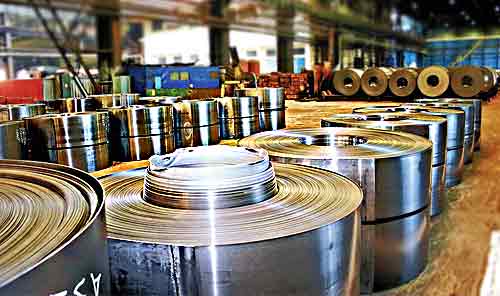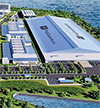Feeling the Effects of New Tariffs on Steel and Aluminum
Both manufacturers and consumers are paying the price for these new tariffs, with many in the former group asking for exclusions.
Q2 2019

According to the website Quantgov.org, “Consumers generally bear the burden of the tax when the import is a final consumer good, and manufacturers generally bear the burden when the import is an intermediate good such as steel or aluminum.” The latter seems to be the case for some American manufacturers who say they are being hurt by the tariffs.
Testifying before Congress last May, Alan Shaw, president and CEO of Electrolux North America Major Appliances, said, “Portions of Section 301 put our U.S. manufacturing in harm’s way because the main beneficiaries of the tariffs will be foreign manufacturers, who are not impacted by Section 301…they are and will continue building appliances outside of the U.S. and importing them into our country.”
Shaw said the proposed tariffs cover key components in the company’s appliances that, in the near term, it is unable to source outside of China, which means the components will cost more, along with the end products. “This increased cost creates what I would call an unintended bias against U.S. manufacturers like Electrolux,” he said.
Shaw added that because there is no viable American supplier for the compressors the company needs, the tariff will not protect any U.S. industry. “All it will do is drastically increase the cost of the single most expensive part of every U.S.-manufactured refrigerator and freezer. Foreign manufacturers, because they are not impacted by the tariff, will not have this same increased cost and will therefore not have to raise their consumer price.”
Even manufacturers who get most of their steel and aluminum from American suppliers have been hurt, according to a New York Times article, which cited the example of Iowa-based Winnebago Industries, which makes motor homes. The tariffs have driven up prices for both domestic and imported metals. Tariffs on Chinese goods have led to higher prices for electrical components, lighting fixtures, tires, and other parts the company imports. Winnebago CEO Michael Happe told The Times his company has been able to pass those costs on to consumers — but isn’t sure for how long.
Andrew Stettner, a senior fellow with the Century Foundation, says the impact of the new tariffs has been delayed somewhat because a number of metal fabricators “had already ordered a lot of their primary metals” for 2019. “On a micro level, some people are very worried about the price of a very important input going up,” Stettner told Area Development. “On the other hand, the data would indicate that there has been robust enough demand that (some manufacturers) have been able to withstand that.” U.S. manufacturing companies added more jobs in 2018 than they had in any year since the early ’90s, Stettner pointed out.
New tariffs on aluminum “have saved that industry,” Stettner said. “Production of U.S. aluminum is up 53 percent; there are a number of new smelters coming online; and 2,000 new jobs have been added.”
Requests for Exclusion
Under Commerce Department regulations, U.S. firms and individuals that use steel and aluminum may file a request to be excluded from the tariffs. Again, according to the website Quantgov.org, as of March 18, there had been a total of 51,345 steel and aluminum tariff exclusion requests filed by 905 firms in 303 congressional districts across 46 states plus Puerto Rico. Of these filings, 45,328 exclusion requests ask for an exemption from the steel tariffs, and steel manufacturers have filed 19,543 objections.
The Bureau of Industry and Security (BIS) had reached a decision on 61.9 percent of the steel exclusion requests: 21,464 have been approved and 6,588 have been denied. Additionally, 6,017 exclusion requests asked for an exemption from the aluminum tariffs, and aluminum manufacturers have filed 935 objections. The BIS has reached a decision on 78.2 percent of the aluminum exclusion requests: 4,069 have been approved and 637 have been denied, according to Quantgov.org.
Finally, there was some good news in mid-May when it was announced the U.S. would lift steel and aluminum tariffs on Canada and Mexico in favor of stronger enforcement actions.
Project Announcements
DSV Global Transport and Logistics Plans Mesa, Arizona, Headquarters Operations
01/24/2026
Poland-Based JGB Brothers Plans Bamberg County, South Carolina, Production Operations
01/23/2026
Electric Research and Manufacturing Cooperative Plans Waddell, Arizona, Transformer Production Operations
01/23/2026
Viking Attachments Expands Morgan City, Louisiana, Manufacturing Operations
01/23/2026
France-Based Reju Plans Rochester, New York, Textile Regeneration Operations
01/23/2026
Heil Trailer International Expands Athens, Tennessee, Manufacturing Operations
01/23/2026
Most Read
-
The Workforce Bottleneck in America’s Manufacturing Revival
Q4 2025
-
Data Centers in 2025: When Power Became the Gatekeeper
Q4 2025
-
Speed Built In—The Real Differentiator for 2026 Site Selection Projects
Q1 2026
-
Preparing for the Next USMCA Shake-Up
Q4 2025
-
Tariff Shockwaves Hit the Industrial Sector
Q4 2025
-
Top States for Doing Business in 2024: A Continued Legacy of Excellence
Q3 2024
-
Investors Seek Shelter in Food-Focused Real Estate
Q3 2025


